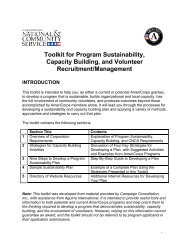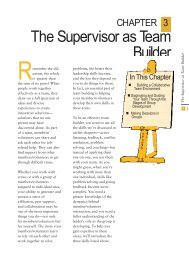MAKE IT LAST FOREVER: THE ... - National Service Resource Center
MAKE IT LAST FOREVER: THE ... - National Service Resource Center
MAKE IT LAST FOREVER: THE ... - National Service Resource Center
You also want an ePaper? Increase the reach of your titles
YUMPU automatically turns print PDFs into web optimized ePapers that Google loves.
IMPLICATIONS OF <strong>THE</strong> RESEARCH<br />
(1) <strong>Service</strong> learning can become institutionalized if one or more of the categories of strategies are utilized, but there is not necessarily<br />
a critical mass of approaches required to make institutionalization occur. Also, as relatively few schools have fully achieved<br />
institutionalization, particularly on a long-term basis, it may be too early to be fully conclusive about whether or not service-learning<br />
has really been institutionalized anywhere. Longitudinal studies of these model schools and districts would be important in order to<br />
see what factors enable service learning to be maintained once it is being widely used and supported.<br />
(2) The educational system is so complex, and so many possible strategies exist, that without proper planning, it is unlikely that<br />
institutionalization will occur.<br />
(3) There are numerous “entry” points into the institutionalization process, which is good, because it allows people to build on<br />
whatever strategies/strengths they already have without needing to start over.<br />
(4) Despite the general rankings of strategies into three levels of importance, service-learning can still be institutionalized without<br />
necessarily using the approaches labeled as Essential in this study. Individual circumstances at schools and districts can make servicelearning<br />
very easy (or difficult) to integrate. Several schools interviewed didn’t need to do much to utilize service-learning - faculty<br />
collectively decided that it was a good idea, and committed to it, and didn’t need to get trained or go through any complex process.<br />
This suggests that organizational culture may in fact be the most significant factor; it requires the least work for the greatest effect.<br />
<strong>Service</strong>-learning can be adopted by a school at any time; all it takes is faculty agreement to use it. All the work involved in adopting<br />
these strategies is an effort to persuade people to support it, when the truth is that some people are already oriented to embrace it and<br />
don’t need persuading in any way.<br />
(5) Schools, districts, and states have the capacity to measure their progress towards achieving success with any of the categories of<br />
strategies. The gathering of this information is likely to be useful in creating a customized process (including policies and programs)<br />
of institutionalization.<br />
(6) <strong>Service</strong> learning, as it is practiced in varied ways with diverse populations and in conjunction with numerous other educational<br />
initiatives, is gaining popularity because of its pliable nature. It can be used to achieve many cognitive, affective, and institutional<br />
objectives. This suggests that greater work needs to be done at the Corporation and the U.S. Department of Education to more<br />
formally link service-learning to the educational system; it is being done at the school and district level, but not with much guidance or<br />
resources of the U.S. Department of Education or the Corporation.<br />
(7) The quality of the service-learning projects, as measured by commonly understood national or state standards of effective practice,<br />
is not an important factor in institutionalization, which is contrary to what most experts in this field suggest. This study found a wide<br />
range of projects in terms of their depth, scope, and scale, and this had little to do with whether or not institutionalization occurred.<br />
This finding is supported by James Toole’s 1999 study of service learning in seven schools, in which 60% of the participants<br />
disagreed with the notion that high level practice makes service learning more legitimate.<br />
114










